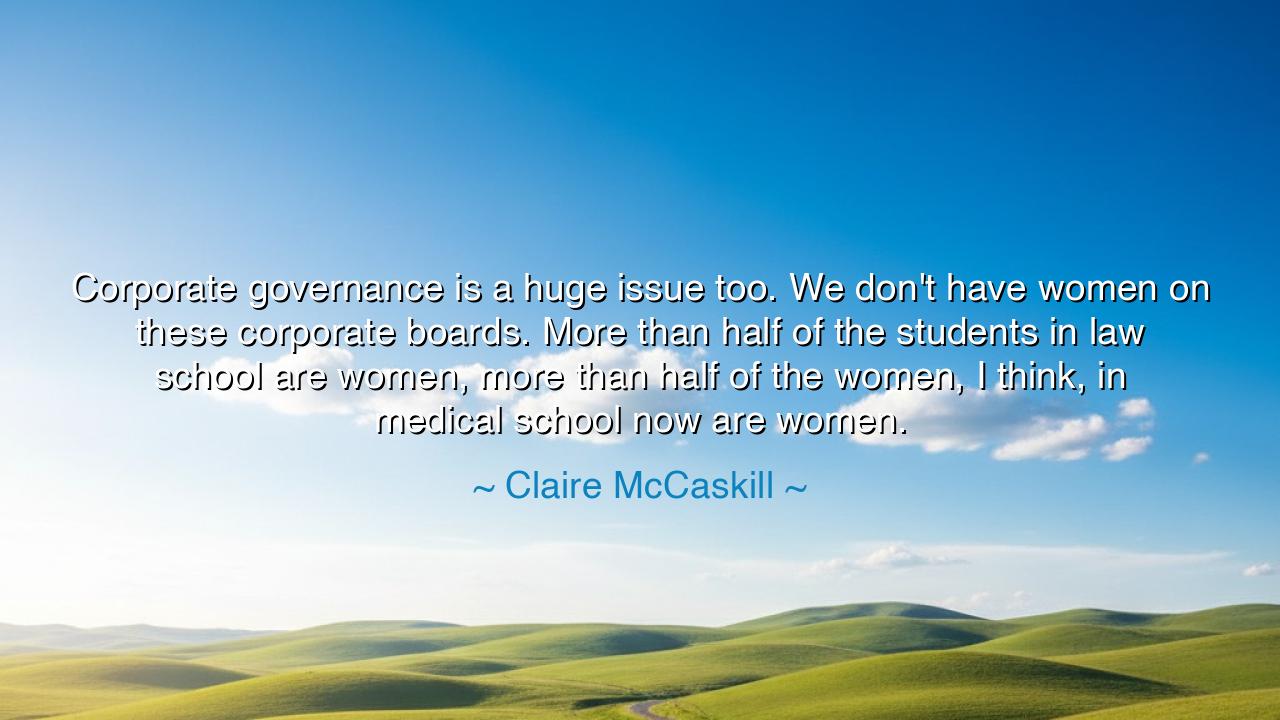
Corporate governance is a huge issue too. We don't have women on
Corporate governance is a huge issue too. We don't have women on these corporate boards. More than half of the students in law school are women, more than half of the women, I think, in medical school now are women.






Hear the words of Claire McCaskill, who spoke with clear vision and righteous urgency: “Corporate governance is a huge issue too. We don’t have women on these corporate boards. More than half of the students in law school are women, more than half of the women, I think, in medical school now are women.” In this statement lies the voice of justice calling out against imbalance. She names the paradox of our age: that though women fill the halls of learning, though they labor and achieve with excellence, they are yet denied their rightful places in the councils of power.
The meaning of her words is sharp. McCaskill points to the divide between education and opportunity. Women, in great numbers, are rising in law schools and medical schools, proving their ability, their knowledge, their worth. Yet when decisions are made in the high towers of corporate governance, their voices are absent, their chairs remain empty, their hands barred from shaping the policies that affect all. It is a call to recognize that equality of access in learning must lead to equality of presence in leadership, or else it is but a hollow promise.
The origin of this truth is centuries of exclusion. For long ages, women were denied entry to the schools of law, barred from the halls of medicine, and mocked if they sought to study. Only through generations of struggle—through pioneers who defied ridicule and prejudice—did women finally claim their place in classrooms. Yet, McCaskill reveals that even as the gates of education have opened, the gates of power remain half-shut. The structures of the past still grip the present, and tradition, cloaked in respectability, resists the full flowering of justice.
History bears witness to this struggle. Consider the tale of Elizabeth Blackwell, the first woman to receive a medical degree in the United States. She overcame ridicule, rejection, and hostility, yet she persevered, blazing a trail for thousands of women who would follow. Her triumph proved that women could equal men in medicine, yet for decades after, female physicians were denied the leadership positions given freely to their male peers. Blackwell’s story mirrors McCaskill’s warning: achievement alone is not enough if the seats of power remain guarded by gatekeepers.
The emotional strength of McCaskill’s words lies in their sense of injustice sharpened by irony. The world already acknowledges women’s ability by filling classrooms with them, yet refuses to honor that same ability when boards are formed and decisions made. This contradiction is a wound in the body of society. It declares loudly that respect for women’s minds is conditional, and that power remains the last fortress where change must strike.
The lesson is clear: respect is incomplete until it manifests in action. True equality demands not only opportunity for education but also opportunity for leadership. It is not enough to applaud women in schools while silencing them in boardrooms. It is not enough to allow women to learn if they are not also empowered to lead. The wisdom of McCaskill’s words teaches us that justice must be consistent, flowing through every level of society, from classroom to corporation.
Therefore, let your actions reflect this truth. If you hold power, open the boardroom doors to women. If you serve in education, mentor women not only for degrees but for leadership. If you are a woman, do not silence your own voice, but claim your rightful place with courage. And if you are a man, do not see this as a loss, but as a strengthening of all, for a society that silences half its people cripples itself.
And so, remember the teaching of Claire McCaskill: corporate governance is a huge issue, for without women at the table, justice remains unfinished. Let us build a world where classrooms lead to boardrooms, where learning leads to leadership, and where equality in knowledge becomes equality in power. Only then shall the promise of education bear its full fruit, and society rise strong upon the wisdom of all its people.






AAdministratorAdministrator
Welcome, honored guests. Please leave a comment, we will respond soon